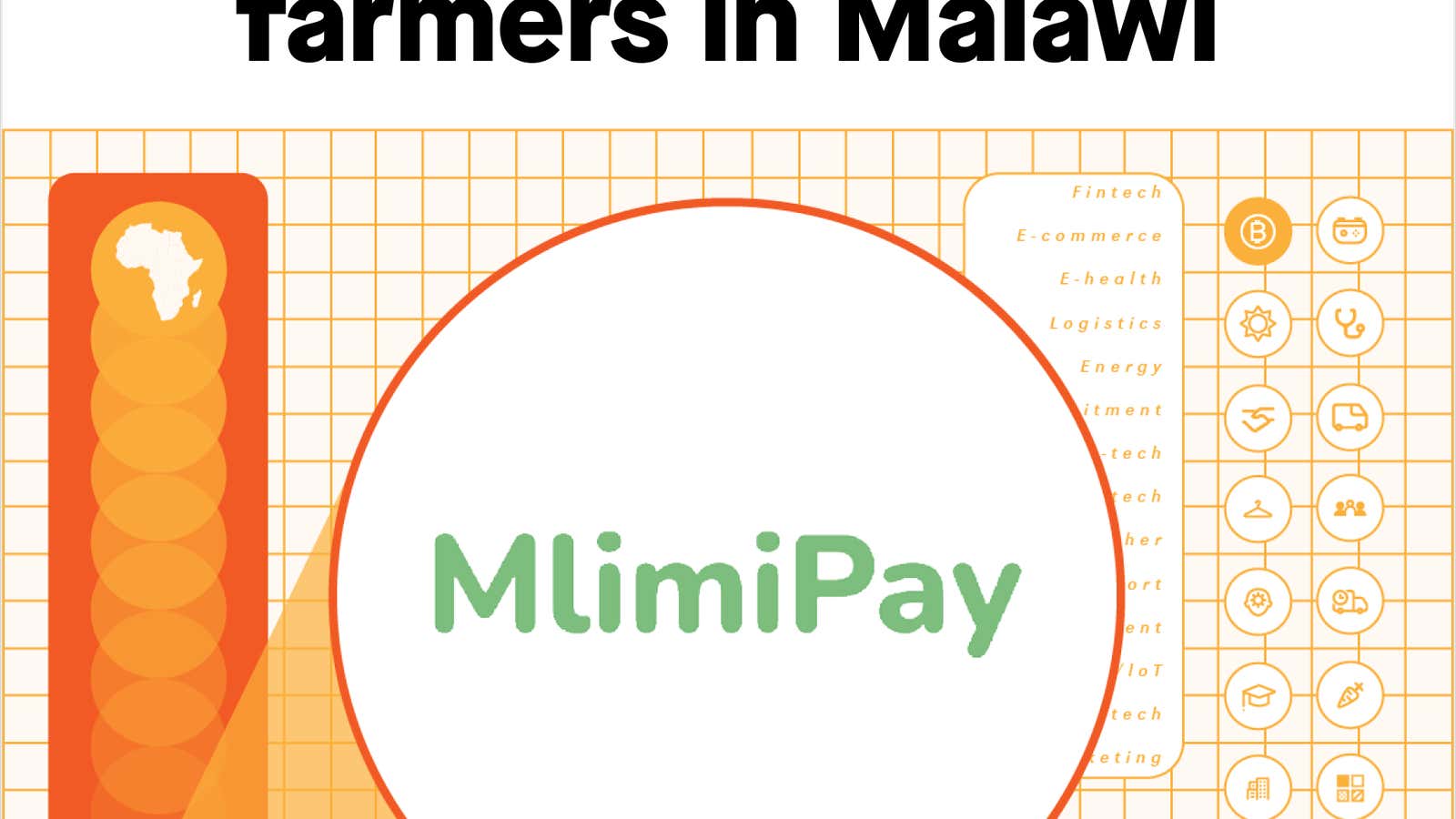Hi Quartz Africa members,
Agriculture drives the African economy, with 23% of the continent’s GDP coming from the sector and 60% of the sub-Saharan population working as smallholder farmers. In Malawi, the sector employs 64% of the population, yet smallholder farmers are disproportionately marginalized or excluded from banking services relative to those who live in urban areas.
Cashflow is one of the biggest problems for smallholder farmers seeking to access financial services, as money comes in at the end of the growing season, but it’s not readily available when they need to buy seeds and fertilizer. Most loans also need to be repaid in regular installments which is incompatible with farming cycles.
Access to affordable finance is crucial to enable smallholder farmers to invest in their businesses, remain resilient against shocks, and prepare for their families’ futures.
A growing number of startups working in the agritech sector in Africa are looking to provide small-scale farmers with digital access to services like savings, payments, credit, and insurance. Malawi-based Mlimi Pay is one of them.
Cheat sheet:
💡 The opportunity: Fintech solutions in the agriculture sector can help farmers invest, save, and make and receive payments. Such technologies can capture the potential of a new generation of smallholder and family farmers. Also, Africa has seen a boom in mobile connectivity. In 2020, Malawi reached an all-time high in terms of mobile connectivity, pegged at 52.3%. Fintech services can ride this surge in connectivity.
🤔 The challenge: Tech startups in Malawi usually struggle to source funding and get government support.
🌍 The roadmap: Mobile technology can provide invaluable assistance to farmers. As such, there’s a need for heavy investment in fintech startups that provide such solutions.
💰 The stakeholders: Banks, the government, mobile network operators, and farm input providers.
By the digits
80%: Share of the Malawi’s workforce employed as farmers
59%: Proportion of smallholder farmers in Malawi who live below the national poverty line
25%-40%: Estimated numbers of smallholder farmers who sell their produce, rather than just live off it, depending on the season
44%: Growth of the agritech sector in Africa between 2016 and 2019
85%: Estimated uptake in mobile and smartphone solution among smallholder farmers in Africa by 2030
The case study
Name: Mlimi Pay
Founded: 2021
Location: Lilongwe, Malawi
Founders: Stanislaus Sakwiya and Orama Chautsi
Mlimi is the word for “farmer” in the Chichewa language, spoken in Malawi. Launched in 2021, the fintech startup developed Mlimi Digital Wallet, a mobile solution designed for smallholder farmers.
The wallet helps farmers in rural areas save funds for subsidized seeds and fertilizers. This allows them to spread out their income and invest in inputs, which ultimately helps them increase yields and gives their families increased financial security.
The digital wallet also allows farmers to check balances and make transactions. In addition, the wallet informs farmers about weather and climate patterns. By using Africa’s Talking USSD and SMS technology, farmers can use the service even with a feature phone.
Stanislaus Sakwiya, the co-founder and managing director for Mlimi Pay, said the idea for the startup came from understanding the difficulties farmers face in accessing regular systems of financing. Even microfinance, sometimes, is a bridge too far. Most such loans need to be repaid in regular installments, and the unpredictability of farming makes it hard to honor these payments.
“Using existing technologies, like Airtel’s Airtel Money, which the majority of smallholder farmers are already familiar with, has helped us to deliver a solution that is affordable, easily accessible, and user-friendly,” Sakwiya said.
Mlimi Pay started with seed capital of just K5 million ($5,000) from an angel investor, coupled with the founders’ personal money. Mlimi Pay is now looking for external investors.
Mlimi Pays claims that the prices set for its services are very affordable for smallholder farmers. For example, when a farmer registers for a Mlimi Digital Wallet account, the company charges K2,000 ($2). Farmers pay K500 ($0.5) in monthly fees, coupled with transaction fees pegged at K350 ($0.35). Currently, Mlimi Pay is only working with farmers in Lilongwe. So far 370 farmers have Mlimi digital accounts.
Mlimi Pay intends to expand by also setting up a microfinance loan program for smallholder farmers and expanding its services outside of Lilongwe.
In conversion with Stanislaus Sakwiya

💸 On funding:
“The biggest challenge for many tech startups in Malawi is funding. We do not have many startup accelerators, and the few that are there do not trust tech startups to thrive. The value is seen when tech startups begin to grow and make a name for themselves.”
📱 On how the digital wallet helps farmers:
“The simplest technology that farmers are familiar with is a feature phone, and most smallholder farmers in Malawi now own one. As such, it is becoming very easy for them to bank and buy seeds and fertilizers without going to a trading center to stand in very long queues. Also, they are updated with weather information so that they can plan properly.”
🧑🏽🤝🧑🏽 On customer engagement:
“We saw an increase of 410.3% from June 2021 to June 2022 in terms of transaction volume.”
Agritech deals to 👀
Nile, a South African agritech startup, raised $5.1 million in May 2022, in an equity funding round led by Naspers Foundry. Nile connects farmers to commercial retailers of fresh produce in South Africa and across the continent.
In April 2022, Farmerline, a Ghanaian agritech startup, announced a $6.4 million pre-Series A investment plus another $6.5 million in debt. Through partnerships with agribusinesses and farm associations, it offers farmers high-quality fertilizer and seeds, free education on climate-smart farming practices, and access to international markets.
In August 2022, iProcure, a Kenyan agritech startup, announced a $10.2 million Series B financing led by Investisseurs & Partenaires. The startup provides agricultural inputs such as fertilizers and seeds at discounted prices compared to prevailing market prices, and is rolling out credit for agribusinesses to make those purchases.
More from Quartz Africa
🦠 How tech and agriculture can help Africa’s pandemic recovery
💾 A lack of basic agricultural data is holding African countries back
🤝🏽 The future of farming in Africa is not agriculture but agribusiness
This brief was produced while listening to “Proud” by Praise Umali (Malawi)
Have a productive week
—Rabson Kondowe, Lilongwe-based Quartz contributor
One 🚜 thing
In Africa, a young and dynamic population is embracing agritech through AI, drones, and mobile platforms to create a more vibrant agricultural sector. With a projected value of $1 trillion by 2030, the continent is poised to become the global center of agritech solutions.
